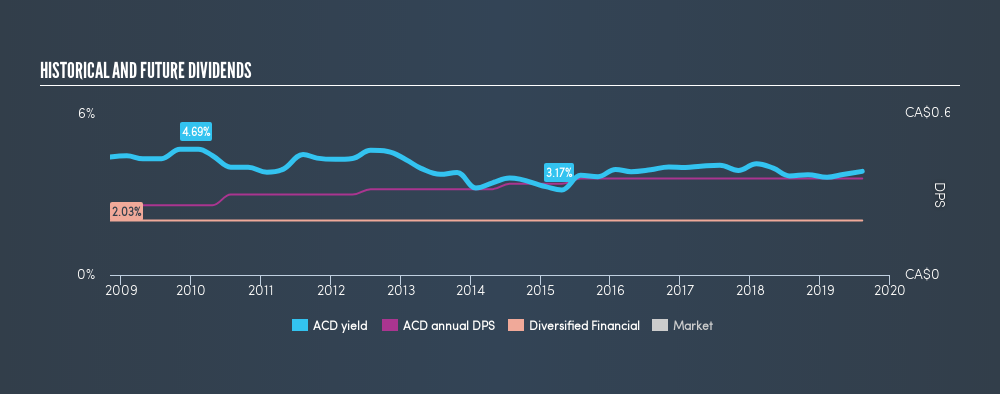- Canada
- /
- Diversified Financial
- /
- TSX:ACD
Is It Smart To Buy Accord Financial Corp. (TSE:ACD) Before It Goes Ex-Dividend?
Some investors rely on dividends for growing their wealth, and if you're one of those dividend sleuths, you might be intrigued to know that Accord Financial Corp. (TSE:ACD) is about to go ex-dividend in just 4 days. If you purchase the stock on or after the 14th of August, you won't be eligible to receive this dividend, when it is paid on the 3rd of September.
Accord Financial's next dividend payment will be CA$0.09 per share, on the back of last year when the company paid a total of CA$0.36 to shareholders. Calculating the last year's worth of payments shows that Accord Financial has a trailing yield of 3.9% on the current share price of CA$9.32. Dividends are an important source of income to many shareholders, but the health of the business is crucial to maintaining those dividends. As a result, readers should always check whether Accord Financial has been able to grow its dividends, or if the dividend might be cut.
View our latest analysis for Accord Financial
Dividends are typically paid from company earnings. If a company pays more in dividends than it earned in profit, then the dividend could be unsustainable. Accord Financial paid out a comfortable 28% of its profit last year. Accord Financial paid a dividend despite reporting negative free cash flow last year. That's typically a bad combination and - if this were more than a one-off - not sustainable.
Generally speaking, the lower a company's payout ratios, the more resilient its dividend usually is.
Click here to see how much of its profit Accord Financial paid out over the last 12 months.

Have Earnings And Dividends Been Growing?
Companies with consistently growing earnings per share generally make the best dividend stocks, as they usually find it easier to grow dividends per share. If earnings decline and the company is forced to cut its dividend, investors could watch the value of their investment go up in smoke. With that in mind, we're encouraged by the steady growth at Accord Financial, with earnings per share up 9.8% on average over the last five years.
Many investors will assess a company's dividend performance by evaluating how much the dividend payments have changed over time. Since the start of our data, 10 years ago, Accord Financial has lifted its dividend by approximately 3.3% a year on average. We're glad to see dividends rising alongside earnings over a number of years, which may be a sign the company intends to share the growth with shareholders.
Final Takeaway
Is Accord Financial an attractive dividend stock, or better left on the shelf? It has been growing its earnings per share somewhat in recent years, although it reinvests more than half its earnings in the business, which could suggest there are some growth projects that have not yet reached fruition. Accord Financial ticks a lot of boxes for us from a dividend perspective, and we think these characteristics should mark the company as deserving of further attention.
Curious about whether Accord Financial has been able to consistently generate growth? Here's a chart of its historical revenue and earnings growth.
We wouldn't recommend just buying the first dividend stock you see, though. Here's a list of interesting dividend stocks with a greater than 2% yield and an upcoming dividend.
We aim to bring you long-term focused research analysis driven by fundamental data. Note that our analysis may not factor in the latest price-sensitive company announcements or qualitative material.
If you spot an error that warrants correction, please contact the editor at editorial-team@simplywallst.com. This article by Simply Wall St is general in nature. It does not constitute a recommendation to buy or sell any stock, and does not take account of your objectives, or your financial situation. Simply Wall St has no position in the stocks mentioned. Thank you for reading.
About TSX:ACD
Accord Financial
Through its subsidiaries, provides asset-based financial services to industrial and commercial enterprises primarily in Canada and the United States.
Low risk and slightly overvalued.
Market Insights
Weekly Picks

THE KINGDOM OF BROWN GOODS: WHY MGPI IS BEING CRUSHED BY INVENTORY & PRIMED FOR RESURRECTION


Why Vertical Aerospace (NYSE: EVTL) is Worth Possibly Over 13x its Current Price


The Quiet Giant That Became AI’s Power Grid
Recently Updated Narratives

Butler National (Buks) outperforms.


A tech powerhouse quietly powering the world’s AI infrastructure.


Keppel DC REIT (SGX: AJBU) is a resilient gem in the data center space.
Popular Narratives


MicroVision will explode future revenue by 380.37% with a vision towards success


Crazy Undervalued 42 Baggers Silver Play (Active & Running Mine)





